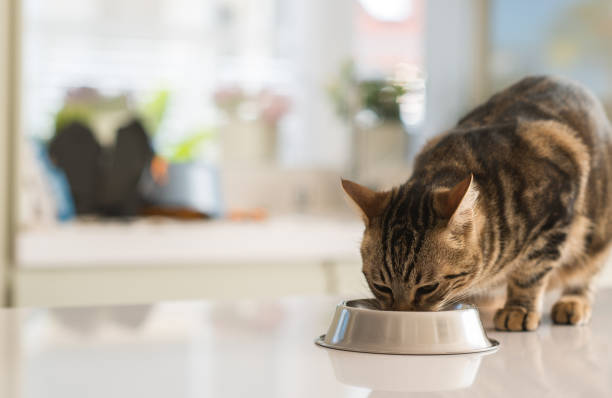Cheese, in all its varieties and presentations, is one of the most popular foods in international gastronomy. Although there are hundreds of types of cheese with its own aroma, texture, taste, and nutritional composition, we can define cheese as a source of protein and fat, tasty and delicious for humans.
In addition to satisfying our palate, cheese offers a lot of energy intake and is beneficial for our health (with a moderate amount, of course). And anyone who lives with a small cat knows that cheese is a food that small felines are generally fond of. However, in PlanèteAnimal, we wondered if a cat could eat cheese and if cheese was good for the cat’s health. Milk and dairy products are dangerous foods for cats, so this question is of paramount importance if you feed your cat naturally. Can you give cheese to a cat? Continue this article to get the answer!
Can you give cheese to a cat?
Yes, you can give cheese to a cat. However, its consumption should be very moderate and cheese is not at all necessary for the diet of the cat.
We explain that cheese is not one of the forbidden foods for cats, but its use should be moderate to prevent digestive diseases. It should also be noted that although cheese is a good source of protein and fat, it should not replace meat, whether it is veal, chicken, turkey or fish. We also remember that cats are predators. To learn more about cheese and cats and how to eat it, we invite you to continue the article Can you give a cheese to a cat? PlanetAnimal.
Read more about Casinostop Click here betways
Visit this site mywikinews
Can cats eat cheese?
Cheese is a source of animal protein, as it is produced from the milk of different mammals. Although the most consumed cheeses in the world come from cow’s milk, there are also very fine cheeses made from sheep’s milk, goat’s milk, etc. As a dairy product, cheese also contains a considerable amount of fat (although there are many reduced-calorie and reduced-fat cheeses) and minerals such as calcium, phosphorus, and magnesium.
Since the cat is a strictly carnivorous animal, protein must be the mainstay and therefore the most abundant thing in its Cat Diet, being accompanied by beneficial fats, vitamins, and minerals. Although cats can consume very moderate amounts of carbohydrates, it should be borne in mind that an excess of this nutrient can cause digestive disorders, in addition to favoring the development of obesity in cats.
Since cheese is a protein-rich food that contains essential fats, it is reasonable to conclude that cats can eat cheese. But the question is not easy, because cheese is also made directly from milk, and most adult cats are lactose intolerant.
While cats are breastfeeding, breast milk is the only food that fits all their nutritional needs. That is why her body produces a large amount of an enzyme called lactase, which causes the digestion of lactose from breast milk. But when the caterpillars are weaned and ready to try new foods, their body slows down the production of this enzyme. It is an important dietary change for the rest of their lives because it means that their body is preparing to live on its own, with no need to receive food from its mother.
Click hare : filmywap.desi 2017
Click hare : newmags
Many adult cats develop lactose intolerance because their body does not produce the enzyme needed to digest milk or at insufficient levels to digest it properly. Therefore, if they ingest milk or dairy products, felines can develop digestive problems, such as gas, vomiting or diarrhea.
What cheese can cats eat?
Although cow’s milk is cheap and easy to obtain, goat and sheep cheese are easy for our cats to digest. Therefore, it is better to choose this type of cheese to avoid dietary problems related to lactose intolerance.
Therefore, you can give your cat cheese as a reward during his or her education and use this food to strengthen his or her good behavioral habits and motivate him or her. increase. Therefore, it is important not to use only food to strengthen the cat. This is because cats can cause overgrowth if they just combine good habits and food. The best solution is to divide your fears and problems into a series of small steps. Meanwhile, lean cheeses such as ricotta cheese and fromage blanc can be added to the home kitchen to complement cat food and meet their needs.
laughing at a cat
A lot of people wonder if you can give a Laughter Cow to a cat. Like other cheeses, a cow that laughs at cow’s milk cheese can be given to cats but in moderation.
Giving Kiri cookie
The Kiri children are from the same company as Laughing Cows. As cow’s milk, this cheese can be given to cats but in moderation. Continue our article Can we give cheese to cats? to know how much cheese to give a cat!
How many cats can eat cheese?
As we have seen, cats can continue to eat cheese in small quantities, as a snack or as an addition to home cooking. Thus, there is no set standard for all cats, but the safe and effective amount of cheese should be appropriate for individual cat size, weight, age, and health.
So it is important to ask your veterinarian to choose the right diet according to your cat’s diet. An expert will be able to guide you on how to introduce cheese into your cat’s diet, giving you advice on appropriate and safe doses to get the best results for its health.

